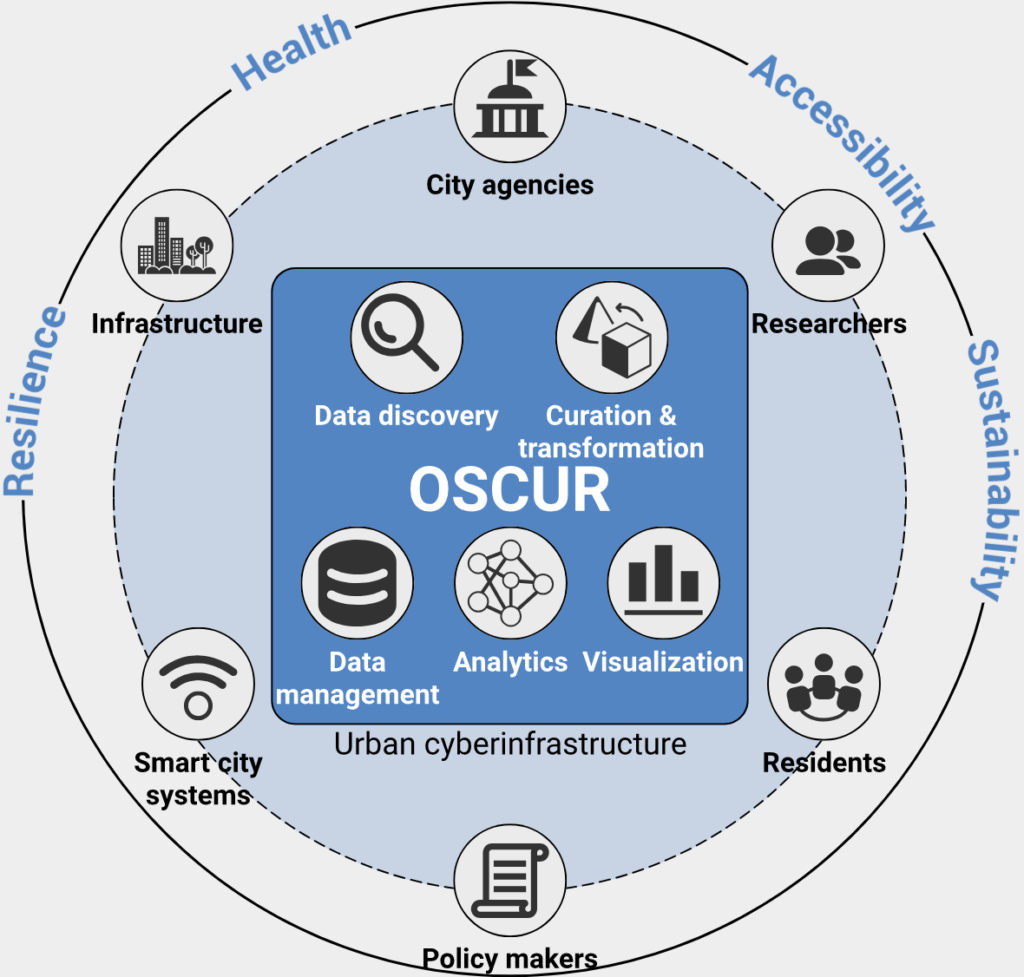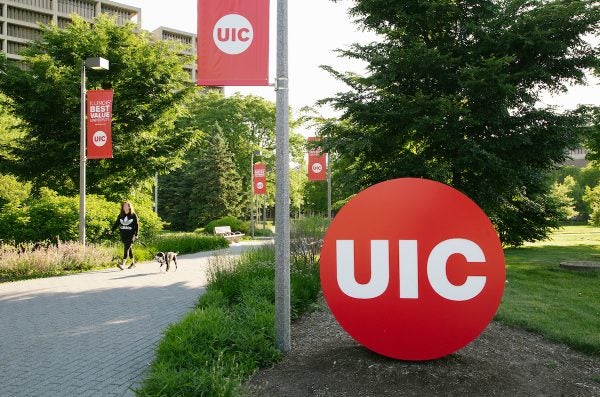OSCUR: Open-Source Cyberinfrastructure for Urban Computing
Cities are the loci of resource consumption, economic activity, and innovation; they are where many societal problems are born and where they must be solved. Given our increasing ability to collect, transmit, store, and analyze data, we have the opportunity to go beyond today’s imperfect understanding of cities to enable better operations, better planning, and better policies. While there are already troves of open data about cities, their potential remains underexplored because of unique challenges related to the diversity and scale of urban data and the complex computations required to obtain trustworthy insights.
The goal of OSCUR is to address two critical obstacles in urban computing: (1) the lack of documented, robust, well-engineered tools and open computing platforms and (2) the dispersed community of cross-disciplinary researchers and developers, which limits knowledge sharing and collective solutions. A core component of the project is the development of a cyberinfrastructure that integrates methods and tools for the exploration of urban data that are scalable, reusable, interoperable, and solutions to common challenges, including data discovery, cleaning, analytics, modeling, visualization, and reproducibility.
OSCUR Newsletter
The OSCUR Newsletter is a quarterly digest of OSCUR’s activities, events, examples, and use case highlights. We intend to send the first newsletter in the coming months. If you are interested in receiving updates about OSCUR, please enter your information here!
OSCUR vision
- Foster partnerships to advance open and reproducible urban analytics.
- Harness the strengths of existing NSF-funded initiatives.
- Promote civic initiatives, global research and education programs.
- Democratize urban computing & analytics across the globe.
OSCUR outcomes
- A novel open-source cyberinfrastructure for reproducible urban computing..
- Cohesive and engaged urban computing community.
- Path towards healthier, more resilient, accessible, and sustainable cities.

What’s new
Research Software Engineer position at UIC
The College of Engineering at the University of Illinois Chicago is seeking a research software…
UIC researchers join national project to turn urban data into healthier cities
The past decade has seen a flood of data about cities, information with the potential…
Urban computing to get a boost with new open-source platform funded by the National Science Foundation
A research team led by Professor Claudio Silva and the Visualization Imaging and Data Analytics…

Partners
OSCUR brings together PIs that have expertise in computer and data science (visualization, data management, analytics, modeling, HCI), policy, and engineering (sustainable & resilient urban infrastructure, network science), with a record of research and practical impact in urban computing, including open-source software and collaborations with city agencies in NYC, Chicago, and Seattle.
The project also includes 50+ collaborators from many disciplines (e.g., urban science, engineering, planning, transportation, health, environmental sciences) who are tackling important scientific questions and leading large urban efforts around the world, as well as city agencies, open-source developers, companies that produce urban data and tools, and outreach organizations.
Catalyzing the Urban Computing Community Through Shared Cyberinfrastructure

OSCUR will serve as the focal point to grow and sustain a strong community of urban researchers, practitioners, and residents, who will be empowered to collaboratively address important urban challenges. It will address critical obstacles to progress in urban computing:
The lack of documented, robust, well-engineered tools and open computing platforms: We will develop open-source tools as well as translate research products to create an extensible software ecosystem to support the urban data lifecycle. To scale the translation process, we will inform the community about the best practices of open-source software development and establish processes and standards to facilitate documentation and contributions to OSCUR.
The complexity involved in creating, sharing, and re-using experiments and analyses: We will deploy a cloud-based, open collaborative environment that supports the use of OSCUR over large and diverse urban datasets (e.g., spatiotemporal, geometry, image). This will make it easy for users to quickly create analyses that are reproducible by design, and that can be debugged, shared, and extended. Drawing upon our prior experience in building computational reproducibility tools, we will also integrate systematic provenance capture into the tools and libraries available in OSCUR, enabling reproducibility even for analyses carried out outside the cloud environment.
The difficulty involved in finding relevant data among the troves of available datasets: While there are many datasets available, they are distributed over many repositories and come in different formats and granularities. Besides, most repositories provide search interfaces that are limited to keyword-based queries or simple faceted searches over the dataset metadata. These are insufficient to express information needs that often arise in analytics and modeling, e.g., find data that can enrich analyses, improve a predictive model, or explain outliers in a dataset. We will create a dataset search engine for urban data that supports data-driven and data relationship queries. By enriching the context of the datasets with the analyses, models, and publications that use them, we will support the FAIR principles for urban data.
Fragmented community: A key objective of our project is to grow and strengthen a cohesive community around urban computing. We have already assembled a diverse team of 50+ researchers and collaborators that cover several geographical areas in the US and abroad, have expertise in different disciplines, and represent multiple groups of stakeholders. They will use and contribute to the infrastructure. Combined with a concerted outreach effort, our project will have a broad reach.


